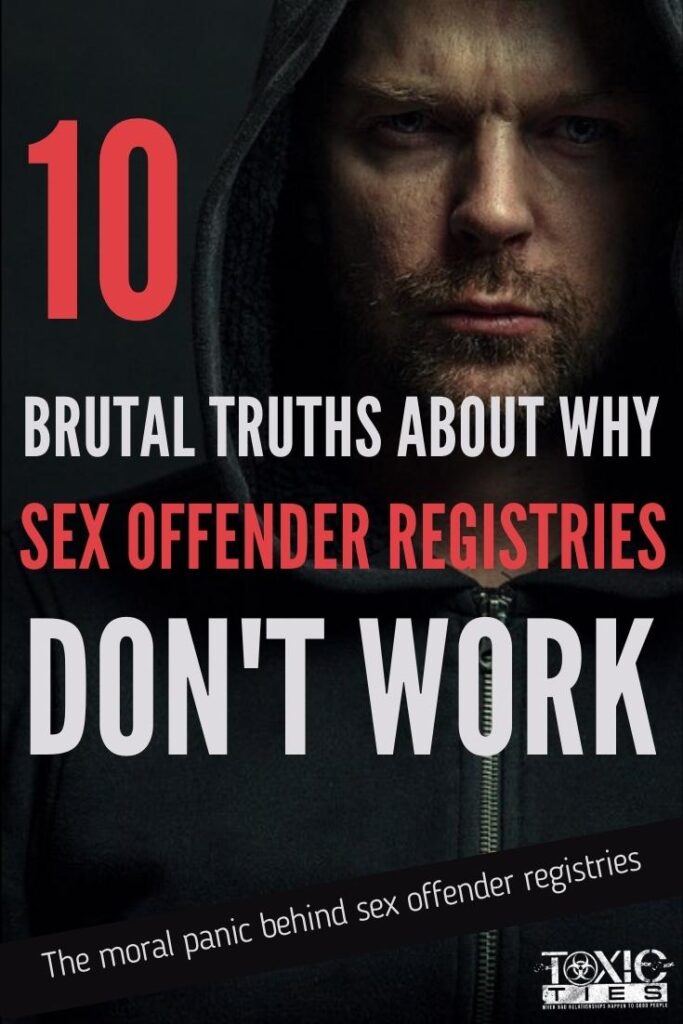As the data undeniably shows, sex offender registries don’t really work to prevent sex crimes. This blog post reveals 10 reasons why.
Sex offenders… No other group of people inspires as much hatred and contempt as sex offenders.
They are the modern-day “folk devil” — deviant, dangerous, and ultimately, unredeemable.
The unspeakable fear and loathing sex offenders inspire is tantamount to what some researchers call “moral panic.”
Moral panic is when a community selects a group of people as the ultimate evil and seeks to destroy or ostracize it.
In this post, I will explain how moral panic played into the creation of the sex offender registration laws.
I will show that most of these laws were passed hastily, without a scientific inquiry into their effectiveness, and in response to an overwhelmingly emotional public outcry.
So let’s look at the history of sex offender registries, to understand how they came to be and why they ultimately don’t work.
The History of Sex Offender Registries
Sex offender registries are a public database of sex offenders’ names, pictures, addresses, and other information.
They were created in the 1990s, in response to a public outcry over several highly publicized cases of sex crimes against children.
Jacob Wetterling Act
Sex offender registration first became law in 1994, with the passage of the Jacob Wetterling Crimes Against Children Act.
The law was named after an 11-year-old boy abducted in 1989 in rural Minnesota by a masked gunman. The brazen kidnapping shook the nation, especially since no one was arrested or charged with the crime.
It took 27 years to locate Jacob’s remains, shattering his parents’ last hope that their son would be found alive.
Although the boy perished, something was borne of this tragedy – a law that required states to maintain a registry of sex offenders, and a hope that other children won’t suffer Jacob’s fate.
That was the initial rationale behind sex offender registry laws – to prevent sex crimes against children.
Megan’s Law
In 1996 another federal law was passed as a way to increase public safety – Megan’s Law.
Megan’s Law was named after a 7-year-old New Jersey girl Megan Kanka who was raped and killed by a registered sex offender who moved across the street from her family.
Megan’s parents argued that had they known that their neighbor was a convicted child molester, Megan would still be alive today.
They fought to amend the Jacob Wetterling Act. Only 89 days after Megan Kanka’s murder, Megan’s Law was passed in her home state of New Jersey. It required the local police to notify the community when a registered sex offender moved into or visited the area.
The offender’s name, age, and address, as well as the crime they committed, became available for public access.
Every state now has its version of Megan’s Law.

Adam Walsh Act
Megan’s Law was followed by the passage of the Adam Walsh Act of 2006.
Although Megan’s Law made the sex offender registries open to the public, the notification system was often vague. For example, Megan’s Law doesn’t require active notification such as police going door-to-door, phone calls, etc.
The Adam Walsh Act strengthened and standardized the sex offender registration and notification (SORN) laws across the nation.
It also increased penalties for all child-related sex crimes and expanded the definition of a “sex offender.” Suddenly the number of people on the sex offender registry skyrocketed, making it appear as if there is a sex crime epidemic.
Arguments In Favor of Sex Offender Registries
Before we get to the reasons why sex offender registries don’t work, let’s look at the arguments and the assumptions behind them.
Public support
It’s not hard to see why sex offender registries have a lot of public support. Their basic premise – to protect children from dangerous predators and empower the public to be aware of their surroundings – is valid.
No wonder politicians keep exploiting that support to gain political clout. After all, people like leaders who are tough on crime, especially sex crimes involving children. This type of “punitive populism” is why sex offender registries are what they are today.
So sex offender registry addresses a public need, at least regarding the perception of safety within a community.
It can save lives
As a parent, you want to do everything in your power to prevent harm to your children.
In Megan Kanka’s and possibly other cases, knowing about a pedophile living in your community could be lifesaving.
Citizens have a right to know if violent offenders are lurking in their neighborhoods.
It can deter re-offenders
The assumption is that the registry, especially if it’s publicly available, could also be a deterrent for a sex offender.
Most crimes are committed with impunity and anonymity. Stripping the offenders of anonymity makes it harder for them to blend in and drift from place to place undetected.

10 Reasons Why Sex Offender Registries Don’t Work
The reasons why sex offender registries don’t work are many.
Here is a summary of the main objections to them, supported by facts and research (see the full list of references at the end of the post).
10. They don’t stop crime
Simply put, sex offender registries don’t prevent crime. Since the induction of these laws, numerous studies have shown that registries don’t reduce the number of sex crimes.
There is also no link between harsher sex crime laws and lower crime rates.
Nonetheless, the moral panic over sex offenders continues to fuel people’s fears, leading them to push for even harsher penalties.
For that reason, many scholars criticize sex offender registry laws as populist knee-jerk legislation that doesn’t predict future sexual offending or increase public safety.
9. Low recidivism
Despite the widely held belief that sex offenders usually re-offend, research doesn’t support that notion. The Bureau of Justice reports that only 7.7 percent of sex offenders are rearrested for another sex crime.
So sex offenders are much less likely to be rearrested for the same crime than people convicted of other crimes.
8. More crime
Sex offender registries don’t work to prevent crime. What’s worse, they lead to more crime.
Since registered sex offenders are deprived of viable housing and employment options, they are often forced into a life of crime. For example, there is a known link between homelessness and crime.
So while few sex offenders commit another sex crime, many commit other crimes, as a result of being unable to support themselves.
Restrictions on movement are another serious culprit. For example, proximity restrictions concerning “child safety zones” often result in unintended violations and “re-offense” arrests, even though no new sex crime was committed.
Other re-offense examples include failure to report a change of address (violation), failure to report your address every 90 days (felony), missing a parole appointment, etc.
7. Unreasonable punishment
The burdens imposed on former offenders are unprecedented and unreasonable.
No other group of law-abiding former felons who have fully served their time is subjected to the same sweeping and severe punishment.
That’s because burdens imposed on sex offenders are born out of tremendous animosity and fear.
At some point, these burdens have to be scrutinized to determine whether there’s any rational foundation for them.
6. A small fraction of offenders
The fact is, most sex offenders are not on any registry.
First, most sex offenses are never reported. Research shows that crimes like child sexual abuse or rape are some of the most underreported crimes in the country.
Second, even when they are reported, offenders are not necessarily convicted and brought to justice. For example, researchers estimate that only about 1 percent of rapists are convicted of the crime.
Third, most sex crimes are committed by first-time offenders, so their names wouldn’t be on any list.
In other words, the sex offender registry only lists a small fraction of offenders, while most sexual predators remain elusive.
5. No rehabilitation
Sex offender registry prevents rehabilitation and reintegration into society.
These laws present an enormous challenge to former sex offenders who wish to reenter society as law-abiding citizens.
It can make finding a job and housing nearly impossible. For example, residence restrictions (SORRs) drastically narrow viable housing options for registered sex offenders, forcing them into low-income communities or even homelessness.

4. Sex offender networks
The public nature of registries may enable the creation of sex offender networks.
If the public can identify and locate sex predators in their area, so can other sex offenders.
Sex offender networking can empower violent offenders to share information and tips, target more victims, and evade law enforcement more efficiently.
Predatory pedophilic networks already exist on the dark web, but they are not necessarily easy to access. Sex offender registries make it easy to identify the right individuals based on their previous offenses and create an organized sex offender syndicate.
3. Vigilantism
Since the sex offender registry in the U.S. is public, it presents a unique issue: vigilantism.
Vigilantism is when a self-appointed individual (or a group of individuals) decides to take the law into their own hands and punish those they deem guilty.
The murder of William Elliot is an especially poignant example of vigilantism. At the age of 20, he had sex with his girlfriend who was days away from turning 16. Elliot served his full sentence and was then put on a sex offender registry. He was shot and killed in his home by a vigilante.
Cases like Elliot’s abound. A recent study revealed 279 separate incidents of vigilantism against registered sex offenders. They ranged from the distribution of unauthorized fliers to murder.
The study also found that vigilantism isn’t limited to registered sex offenders. It extends to their families and even to individuals suspected of having committed a sexual offense.
So these laws not only enable vigilantism against rehabilitated offenders, they expose innocent people to be publicly scrutinized, ostracized, harassed, persecuted, and even killed.
2. Nonviolent offenders
Sex offender registries are flooded with people who are nonviolent offenders.
A common understanding of the term “sex offender” is that it’s a predator who’s likely to abduct and/or sexually assault a child.
That’s what people think when they hear the words “sex offender.” However, most individuals who are labeled this way are not kidnappers or rapists. They can be
- young people who’ve had sex with someone who was younger than the age of consent in that state, like in the case of the aforementioned William Elliot.
- adolescents and even children as young as 8 accused of public nudity, touching another child’s genitalia over the clothes, or other inappropriate acts that are more symptomatic of immaturity and curiosity than deviancy.
- adults convicted of public urination or indecent exposure.
- victims of sex crimes themselves. For example, traumatized people can act out in sexually inappropriate ways as a way of dealing with their sexual victimization. Similarly, some victims of human trafficking in the U.S. are arrested with their traffickers and put on sex offender registries.
1. The “stranger danger” myth
The biggest reason why sex offender registries don’t work is because they overemphasize predatory strangers.
Research consistently shows that most crimes of sexual nature are committed by someone a victim knows.
For example, in cases of child sexual abuse, only 10 percent of victims don’t know their perpetrator. In 30 percent of cases, the perpetrator is a family member.
Similarly, 3 out of 4 women who are sexually assaulted know their assailant.
Sex offender registries create a false impression that anonymous strangers are the biggest threat when it comes to sex crimes.
This type of attitude can make people less likely to recognize the red flags in someone they know, especially if it’s someone in a position of authority, like a teacher or a priest.
As a result, they may also fail to educate their children about the possibility of inappropriate behavior coming from an adult they know and trust.
The truth is, parents who are extra vigilant about strangers are not vigilant enough about the people they know. They are acting out of a myth perpetuated by sex offender registries.

Final thoughts on why sex offender registries don’t work
Sexual violence is a serious issue in our society. It’s pervasive, multidimensional, and often clandestine. So we don’t know the true scope of it.
Sex offender registry laws attempt to solve this issue by pointing out the individuals convicted of sex crimes. The idea is that by making the identities of these people transparent and accessible to the public, we can feel safer and draw an even thicker line between “us” and “them.”
But the question we should be asking ourselves is not “Who?” but “Why?”
The question is not “Who are the sex offenders and where do they live?” but
What are the cultural messages that inform a high rate of sex crimes?
Which policies will lead to a reduction in these rates? and
Are sex offender registries one of these policies?
As it stands, an overwhelming amount of research suggests that it is not.
People who commit sexual offenses should be held accountable for their actions. But sex offender registries extend the punishment indefinitely, long after the sentence’s been served.
Not to mention, they victimize children, adolescents, and young people by labeling them “sex offenders” for minor offenses. Sometimes for life.
In other words, public sex offender registries don’t work. Not only are they ineffective, but they also do more harm than good.
They punish people without increasing public safety, and they are based on misconceptions, myths, and mass hysteria about sexual predators.
References
Alper, M., & Durose, M.R. (2019). Recidivism of Sex Offenders Released from State Prison: A 9-Year Follow-Up (2005-14). U.S. Department of Justice, Bureau of Justice Statistics.
Cann, D., & Isom Scott, D. A. (2020). Sex Offender Residence Restrictions and Homelessness: A Critical Look at South Carolina. Criminal Justice Policy Review, 31(8), 1119–1135. https://doi.org/10.1177/0887403419862334
Cubellis, M.A., Evans, D.N., & Fera, A.G. (2019) Sex Offender Stigma: An Exploration of Vigilantism against Sex Offenders. Deviant Behavior, 40(2), 225-239. DOI: 10.1080/01639625.2017.1420459
Drake, B., Sohn, Y., Morrison, M., & Jonson-Reid, M. (2021). In what kinds of communities do people on the sex offender registry live? An analysis of ten states. Children and Youth Services Review, 127, https://doi.org/10.1016/j.childyouth.2021.106061.
Ellman, I. M. (2021). When Animus Matters and Sex Offense Underreporting Does Not: The Sex Offender Registry Regime. University of Pennsylvania Journal of Law & Public Affairs, Forthcoming. http://dx.doi.org/10.2139/ssrn.3817201
Lussier, P. & Mathesius, J. (2019). Not in My Backyard: Public Sex Offender Registries and Public Notification Laws. Canadian Journal of Criminology and Criminal Justice, 61(1). DOI: 10.3138/cjccj.2018-0026
Miller-Perrin, C.L., Perrin, R.D., & Renzetti, C.M. (2021). Violence and Maltreatment in Intimate Relationships. (2nd edition). Sage.
Mogulescu, K., & Goodmark, L. (2020). Surveillance and Entanglement: How mandatory sex offender registration impacts criminalised survivors of human trafficking. Anti-Trafficking Review, (14), 125-130. https://doi.org/10.14197/atr.2012201410
Montaldo, C. (2021, February 16). History of Megan’s Law.








I thought your article was great. There are simply too many “feel good” laws that seem logical on the surface but in-fact give a false sense of security. These registries cast too wide a net and hurt people who’ve perpetrated victimless crimes instead of directly targeting the truly bad actors. Creating paranoid laws with unintended consequences actually makes things worse. It makes perfect sense that preventing an ex-felon from making a living breeds resentment fostering new criminal activity. Most people don’t see that because the average person is usually too intellectually lazy to take the few mins to consider what are actually in these laws. They just believe whatever the politician tells them only to become more disappointed when these laws don’t work. Sadly, being intellectually lazy has sadly become the American way.
Hello Lana,
Great site! I have two challenging parents, one of which I think is covert narcissistic, the other who’s a “fixer”. I especially like that your site offers tips on how I can change MY behaviour to make interactions with them less challenging, as opposed to saying “oh it’s all their fault”.
If/when you do another blog post, I’d be really interested in seeing one about unsolicited advice. Your post on “Martyr Complex” touches on it, though I’d like an article that’s much like your article on Playing the Victim (one of your best, IMO), specifically:
*how I can recognize unsolicited advice?
*how I deal with it?
*what if I’m the one offering it?
Thanks for all your posts!
Hi Toren!
Thanks so much on your feedback! That is a great idea for a blog post. You gave me something to write about next. Thanks so much and thank you for reading!
Sincerely,
Lana